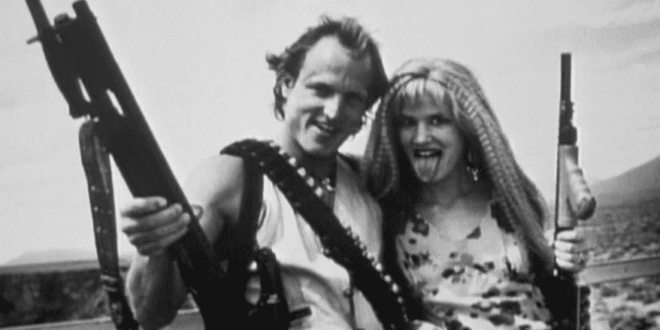Natural Born Killers is a controversial and provocative film directed by Oliver Stone that’s known for its intense exploration of violence, media, and the American psyche. It’s also known for spurring debates on movies and “copycat” crimes. The movie, released 30 years ago this month, is based on a story by Quentin Tarantino, though Stone significantly altered the original script, leading to a distinct blend of dark satire and psychological drama.
The film follows the story of Mickey and Mallory Knox, a young couple portrayed by Woody Harrelson and Juliette Lewis, who embark on a cross-country killing spree. As they murder rather indiscriminately, the media glorifies them, turning them into national celebrities. The film critiques the media’s role in sensationalizing violence and its impact on society, and, ironically, became itself part of the longstanding debate over whether or not violent films create violent “teenagers.” This is even more clear as a supposed journalist, Wayne Gale (Robert Downey Jr.), appears and his show “American Maniacs” becomes increasingly tied together with the mass murderers it is depicting.
Themes of Natural Born Killers
Natural Born Killers is rich in themes, most notably the media’s obsession with violence and the desensitization of the public to brutality by mass murderers, serial killers, or societal institutions. The film also delves into the psychological effects of childhood trauma, the nature of fame, the corrupting influence of the media on public perception, and the phenomenon of escapism.
Stone uses a hyper-stylized approach, including rapid cuts, shifting film stocks, and surreal imagery, to create a chaotic and disorienting viewing experience that mirrors the insanity of the characters and the world they inhabit (Rodney Dangerfield is particularly memorable as Mallory’s twisted, abusive father).
Controversy and Impact
The consistently disturbing film sparked considerable controversy upon its release due to its graphic violence and the suggestion that it might incite real-life violence. Several copycat crimes (including killings) were reportedly inspired by the film, leading to debates about the influence of violent media. For example, it’s alleged that the Columbine killers code-named their attack “NBK,” which stands for Natural Born Killers.
Despite – or perhaps because of – its controversial nature, Natural Born Killers has garnered a cult following and remains a significant work in Oliver Stone’s filmography.
Critical Reception
Critics were divided on the film. Some praised it as a bold and unflinching critique of media culture, while others condemned it for what they saw as a hypocritical glorification of the very violence it claimed to critique. Why? Probably because Mickey and Mallory are depicted as being pretty cool throughout.
Over time, however, it has been reassessed by many as a prescient and darkly satirical masterpiece that remains relevant in discussions about media responsibility and the effects of violence in popular culture.
It’s tough to put the media issue aside, especially for people in the media. For example, on MSNBC’s Morning Joe, former GOP congressman Joe Scarborough mentioned “the harvest sown from violent, mind-numbing video games and gruesome Hollywood movies that dangerously desensitize those who struggle with mental-health challenges…”
That being said, the actual violent crime rate is actually decreasing in the United States, and violence obviously existed in society well before films like Natural Born Killers, video games, Marilyn Manson, or The Beatles (remember Charles Manson’s “Helter Skelter”?) ever existed. So, to anyone really paying attention, it seems like there is a bit of scapegoating going on.
Legacy
Natural Born Killers continues to be a subject for discussions about the role of the media in society and the portrayal of violence in film. Its innovative visual style and daring narrative structure have influenced a generation of filmmakers, while its themes remain as potent and controversial as ever.
 PopHorror Let's Get Scared
PopHorror Let's Get Scared




